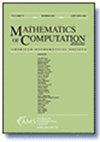On the seeds and the great-grandchildren of a numerical semigroup
IF 2.2
2区 数学
Q1 MATHEMATICS, APPLIED
引用次数: 0
Abstract
We present a revisit of the seeds algorithm to explore the semigroup tree. First, an equivalent definition of seed is presented, which seems easier to manage. Second, we determine the seeds of semigroups with at most three left elements. And third, we find the great-grandchildren of any numerical semigroup in terms of its seeds. The the right-generators descendant (RGD) algorithm is the fastest known algorithm at the moment. But if one compares the originary seeds algorithm with the RGD algorithm, one observes that the seeds algorithm uses more elaborated mathematical tools while the RGD algorithm uses data structures that are better adapted to the final C implementations. For genera up to around one half of the maximum size of native integers, the newly defined seeds algorithm performs significantly better than the RGD algorithm. For future compilators allowing larger native sized integers this may constitute a powerful tool to explore the semigroup tree up to genera never explored before. The new seeds algorithm uses bitwise integer operations, the knowledge of the seeds of semigroups with at most three left elements and of the great-grandchildren of any numerical semigroup, apart from techniques such as parallelization and depth first search as wisely introduced in this context by Fromentin and Hivert [Math. Comp. 85 (2016) pp. 2553–2568]. The algorithm has been used to prove that there are no Eliahou semigroups of genus论数值半群的子代和曾孙
我们提出了一种种子算法来探索半群树。首先,给出了种子的等价定义,该定义似乎更易于管理。其次,我们确定了最多有三个左元素的半群的种子。第三,我们根据它的种子找到任何数值半群的曾孙。右生成器后代(RGD)算法是目前已知最快的算法。但是,如果将原始种子算法与RGD算法进行比较,就会发现种子算法使用了更复杂的数学工具,而RGD算法使用了更适合最终C实现的数据结构。对于原生整数最大大小的一半左右的属,新定义的种子算法的性能明显优于RGD算法。对于将来允许更大的本地整数的编译器来说,这可能是一个强大的工具,可以探索半群树,直到以前从未探索过的属。新的种子算法使用位整数运算,除了并行化和深度优先搜索等技术(由Fromentin和Hivert [Math]在此背景下明智地引入)之外,还使用最多有三个左元素的半群的种子和任何数值半群的曾孙的知识。Comp. 85 (2016) pp. 2553-2568]。利用该算法证明了66 66属的Eliahou半群不存在,从而证明了66 66属的Wilf猜想。我们还发现了3个属667的Eliahou半群。其中一个半群既不是Eliahou-Fromentin型,也不是Delgado型。然而,它是Shalom Eliahou建议的一个新家庭的成员。
本文章由计算机程序翻译,如有差异,请以英文原文为准。
求助全文
约1分钟内获得全文
求助全文
来源期刊

Mathematics of Computation
数学-应用数学
CiteScore
3.90
自引率
5.00%
发文量
55
审稿时长
7.0 months
期刊介绍:
All articles submitted to this journal are peer-reviewed. The AMS has a single blind peer-review process in which the reviewers know who the authors of the manuscript are, but the authors do not have access to the information on who the peer reviewers are.
This journal is devoted to research articles of the highest quality in computational mathematics. Areas covered include numerical analysis, computational discrete mathematics, including number theory, algebra and combinatorics, and related fields such as stochastic numerical methods. Articles must be of significant computational interest and contain original and substantial mathematical analysis or development of computational methodology.
 求助内容:
求助内容: 应助结果提醒方式:
应助结果提醒方式:


